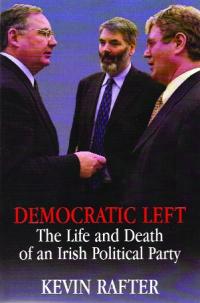Democratic Left: the life and death of an Irish political party
Published in 20th-century / Contemporary History, General, Issue 3 (May/June 2011), Reviews, Volume 19
Democratic Left: the life and death of an Irish political party
Kevin Rafter
(Irish Academic Press, Ä19.95)
ISBN 9780716531128
Although only in existence for seven years and never amounting to more than a few hundred members, the Democratic Left (DL) alumni of two Labour leaders as well as numerous other prominent figures in Irish progressive politics make the party an interesting subject for study. There are harshly differing views on what the DL project was. Rafter begins his work seeking to position the party within the crisis of the European Left that followed the collapse of the Eastern Bloc. DL is presented as an attempt to forge a new, radical, post-Leninist socialist movement to the left of social democracy. For others, not least their former comrades in the Workers’ Party (WP) from which DL broke in 1992, such lofty ideological concerns are the wrong place to start. This more jaundiced approach sees the project as simply a drawn-out bargaining ploy used by talented personalities whose political careers started with, and were bankrolled by, a paramilitary-linked movement to obtain social democratic respectability and a place at the cabinet table. Rafter’s study, with its focus on party ideology and finance, should go some way towards testing both positions.In mapping out Democratic Left’s break with the Workers’ Party, however, faults in methodology appear. Quoting a producer of a 1991 BBC Northern Ireland documentary concerning the Workers’ Party and what are referred to throughout the book as ‘allegations of criminality’, it is stated that a WP member fled the country after a stash of forged dollars along with a party printing press were uncovered in 1982. What this would seem to be referring to is the discovery of forged £5 notes in 1983. Eamon Gilmore is also quoted as stating that if former party president Tomás MacGiolla had supported a motion to reconstitute the WP the organisation would not have split. In fact MacGiolla did support the motion in question and Gilmore’s mistaken recollection is not corrected. The details of both incidents are on the public record and point to a more troublesome and widespread issue in Irish political writing, particularly when concerning republicanism—the failure to thoroughly cross-reference sources. This problem is compounded by the use of often biased journalistic accounts as source material, an issue that also bedevils this part of the study. Rafter’s charting of Democratic Left’s passage through coalition government to eventual merger with the Labour Party is on surer, if overly narrow, ground, relying as it does mainly on interviews with a handful of leading DL personalities and party documents.These problems aside, what emerges is the story of a party that Pat Rabbitte claimed was intent on filling a space in Irish society to the left of Labour but which was actually dominated by electoralism revolving around a dwindling group of TDs. This is not to diminish what this small group of talented politicians managed to achieve as part of the 1994–7 ‘rainbow’ coalition, during which the ‘liberal agenda’ was greatly advanced and, through DL leader Proinsias De Rossa’s efforts, the social welfare system modernised. Other studies have indicated the middle-class basis of DL membership and this image is confirmed in Rafter’s account, one internal report fearing the party’s image was more that of ‘social workers than socialists’. The picture is of a party that drifted into a managerial form of social democracy. Cabinet posts rather than policy requirements emerge as being the key issues of debate during the 1994 coalition discussions with a very accommodating Fine Gael leader, John Bruton, and a less welcoming Labour leader, Dick Spring.Rafter highlights DL’s strong anti-irredentist approach to Northern Ireland as key to its identity. The criticism of former WP leader Seán Garland that some of his former colleagues had ‘little feeling for the involvement in Northern Ireland’ is dismissed. Policy documents and fine Dáil speeches on the need to develop a non-sectarian future are quoted at length, but direct input from any of the handful of party activists operating north of the border may have revealed more than a tincture of truth in Garland’s assertion.DL’s identity crisis intensified with the defeat of the ‘rainbow’ government in 1997, with the party leadership increasingly unsure of whether the party had a historic mission, much less what it was. Rafter goes into detail on how a lack of finance was pushing the DL leadership towards considering a future within a Labour party that they had spent most of their pre-coalition careers deriding. Also on their minds was the rise of Sinn Féin, a growing presence in the working-class communities that DL represented but within which, in the main, it was not organised.In the end the merger with Labour plays out with De Rossa, and to a lesser extent Liz McManus, being corralled into ending DL through the ‘good cop, bad cop routine’ of their Dáil colleagues Eamon Gilmore and Pat Rabbitte, with the latter holding secret meetings with Labour leader Ruairí Quinn in a manner similar to his activities prior to the 1992 split in the WP.Rafter’s account does not answer all the issues raised by DL’s story but it would point to Garland’s assertion—that ‘history will demonstrate that they [Democratic Left’s leaders] were opportunists who saw a way in which they could carve out a space for themselves and a career in politics’—being more unfair to some of his former Workers’ Party colleagues than to others. HI
Scott Millar is co-author (with Brian Hanley) of The lost revolution: the story of the Official IRA and the Workers’ Party (Penguin Ireland, 2009).
















